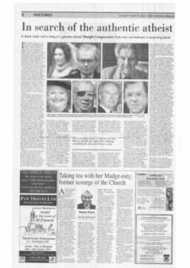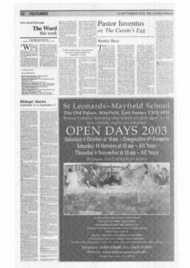Page 6, 19th September 2003
Page 6

Report an error
Noticed an error on this page?If you've noticed an error in this article please click here to report it.
Tags
Share
Related articles
Here We Go Again
Atheist Writer Leaves Books To The Church
Vatican "unable" To Talk With Atheists
Rome 'bridge' With Atheists
Atheist Congress In 1942
In search of the authentic atheist
Is there really such a thing as a genuine atheist? Dwight Longenecker finds true non-believers in surprising places
Ihave a curious respect for atheists. There is something heroic about an outspoken atheist. He wears his denial of God on his sleeve with a certain panache. He challenges the deity as Cyrano de Bergerac duels with death. The atheist courageously contradicts the instincts of the entire human race to declare the non-existence of God. Like a latter day Don Quixote, the atheist rides off to joust with the windmills of superstition, religion and the fairy tale deity. With touching absurdity. the crusading atheist overlooks the fact that he spends time and effort refuting something he does not believe exists.
That is why I like atheists. The rebel in me always admires someone who paddles upstream, and should they attempt to scale a waterfall in their canoe my admiration for them increases. The campaigning atheist is like that. Despite all the evidence, despite the universal religious instinct of the human race, he acts on his solemn belief that there is nothing to solemnly believe in. Because of his passion I have a grudging respect for the militant atheist, but that is also why I don't believe he is really an atheist. He believes too much and cares too much for truth to really be an atheist.
Is there really such a thing as an utterly authentic atheist? I think so. I have a dreadful feeling that there exists a sort of human sub-species who have last their spiritual capacity completely. These authentic atheists do not profess belief in God, but neither do they profess disbelief in God. Instead they seem unaware of the concept altogether. They do not hate the Church or say the Bible is a fairytale. They do not spit out bigoted remarks that blame the Pope for the Holocaust or missionaries for murder. They do not demolish the arguments for the existence of God, say the universe is random, or accuse Billy Graham of being a simpleton. They do not attack religion; they arc simply unaware that such a thing as religion exists. These are the authentic atheists. They plod through life eating, working, shopping, breeding and sleeping and God never seems to flit across their consciousness. Members of this sub-species may be sparkling sophisticates or ill-bred boors. They may he the decent and moral folks next door or they could be despicable murderers. In a frightful way, it doesn't matter. If they exist, perhaps they have bred and spread like the alien body snatchers, and exist in our midst like spiritual zombies, indistinguishable in the teeming mass of humanity except to those few who see them and tremble.
Then there are the truly secret Alieists. These are the ones who have adopted the best and most sinister disguise of them all: they have become religious. They lurk in the stalls of cathedral choirs as well as the stalls of the Christmas bazaar. The religious atheists sing and speak the words of religion but do not believe in a God that is real in any sense of the term. They worship instead a deity of their own imagining — a comfortable grandfather in the sky, or a Great Spirit who gives them pleasant dreams but makes no demands. The God of earthquake, wind and fire, as well as the God of the still small voice is an alien and unreal creature to these soulless devotees of a soothing religion.
My imagination is too vivid. I am spinning stories and jesting to make a point. Because people laugh and cry I'm sure all humans have souls, even if they neglect them. But if my hunch is right that some people never give God a thought, then they are the best evidence that such a thing as an atheist might exist after all. If such people exist then we are witnessing a radical and tragic decline in the human race, for it is sub-human to exist without a god of any kind. Real religion is a universal part of the human condition. In every culture and language — from primitive tribesmen who grunts at the stars to sophisticated technicians who grunt at computer screens — the troublesome religious instinct persists in a most stubborn and triumphant way.
When you look at the human reli
gious instinct from a distance, doesn't it seem quirky and unexpected? If we are only brutes, why this universal, tender and mysterious instinct to fall on our faces and before our immense and intimate maker? If we are animals why do we see spiritual beings everywhere? Dogs sniff and lift their legs at trees, men see mournful dryads imprisoned there. The real religious instinct in man is a kind of madness, and is as unexpected, beautiful and bizarre as those other forms of human madness called music, laughing and dancing. What is this surprising inclination to worship and sing to some Almighty Being? What instinct causes men to build an Aztec
Temple, Stonehenge or Chartres, a basilica or a Baptist chapel, a ziggurat, the Parthenon or Angkor Wat? There is virtually no human society anywhere in time or place where religion is non existent. Other than the basic social functions, is there any other phenomenon that is more com
mon to human beings than religion? In fact you could almost use the instinct and ability to pray as the mark of what it is to be human. Perhaps we should be called homo orans instead of homo sapiens. When a humanist declares his independence from religion he is not exalting his humanity, instead he is declaring himself sub-human, for the whole of human history and culture declares that a glorious and eccentric part of being human is to be religious.
The man from Missouri reduces the wild and wonderful phenomenon of religion to the idea that God is merely the projection of humanity's need for the ultimate sugar daddy. His theory goes like this: primitive man needed to magnify ordinary authority figures like fathers and kings and project them into heaven to create an almighty being to comfort him in the face of the everlasting darkness and reward him with eternal life. In other words, the whole religious phenomenon is a huge case of corporate wishful thinking.
There are three problems with this. First of all, it is incredibly dull. This is not sort of person you want to go on holiday with. The second problem is that this doesn't describe the god of most religions. In most religions the gods are not sugar daddies who reward their children with pink clouds of cotton candy in the afterlife. Instead they are cruel and violent supernatural beings who are more likely to devour you than delight you. Even the Christian God — the great
sugar Daddy of them all — threatens final judgement and eternal damnation. This is not what 1 would have wished for it' I were thinking wishfully. Let us stand this on its head. Given that the god of most religions is a lion, not a pussycat, perhaps it is the atheist who is engaged in wishful thinking.
There is a third problem with this line of thought, and it is this problem that is most disturbing. Saying God is the result of a corporate wish is a kind of bathtub plughole mentality. Everything, bubbles and scummy bath water alike, can go swirling down into it until nothing is left. The problem can he stated like this: if God is simply a case of wishful thinking, then everything good, beautiful and true might also be explained away by the same devilish logic. Indeed everything bad, ugly and false can also be whisked away by the same magic, So, for instance, if God is the result of our wishful thinking, then morality is merely our need to impose control in our society. Patriotism becomes a projection of our bigotry and xenophobia. Beauty is no more than my own erotic urgings projected outward, and truth itself is simply my sad attempt to impose order and meaning on the chaotic and meaningless cosmos. If all is wishful thinking, then this strange phenomenon we call love may only be a projection of our own pitiful infantile needs. If all these things are simply the projection of my own mind, then perhaps the physical world is also only real within my own perception. We know the senses can be reduced to electrical impulses to the brain. Perhaps the whole beautiful, cruel, tender and hilarious world is nothing but an electrical fizzle in my head. This is the way the world will end, not with a bang, but a fizzle.
Couldn't it be that the idea that God is a projection of the human imagination is a simple reversal of the truth? The alleged atheist has strayed into a hall of mirrors and got lost. He's mistaken a reflection for reality. It might look like God is a projection of our imagination, but the truth is we are a projection of his imagination. The ancient texts confront and correct this very problem. They warn us against making God in our own image and specifically tell us that we are made in His image. Either position looks like it might be-true, but then reflections do look like the real thing. Whether you think God is a projection of man or man a projection of God depends on where you start. If you start with yourself, then God is a projection, but if you start with God, you are the projection. This being the case, we must then ask ourselves which is the more logical starting point — you or God? Who is more likely to have been there first?
This essay is an excerpt from Longenecker's new book, Adventures in Orthodoxy, which he describes as "A Chestertonian romp through the Apostles' Creed". The book is available from the author whose email is [email protected]
blog comments powered by Disqus















